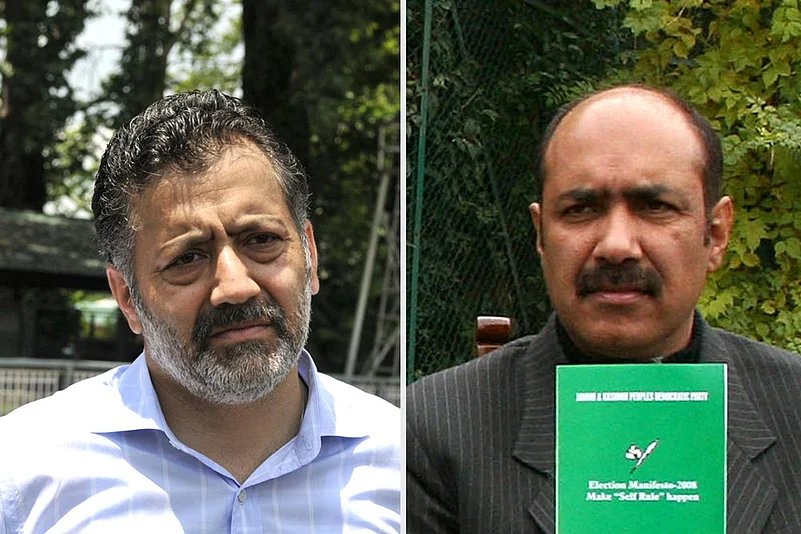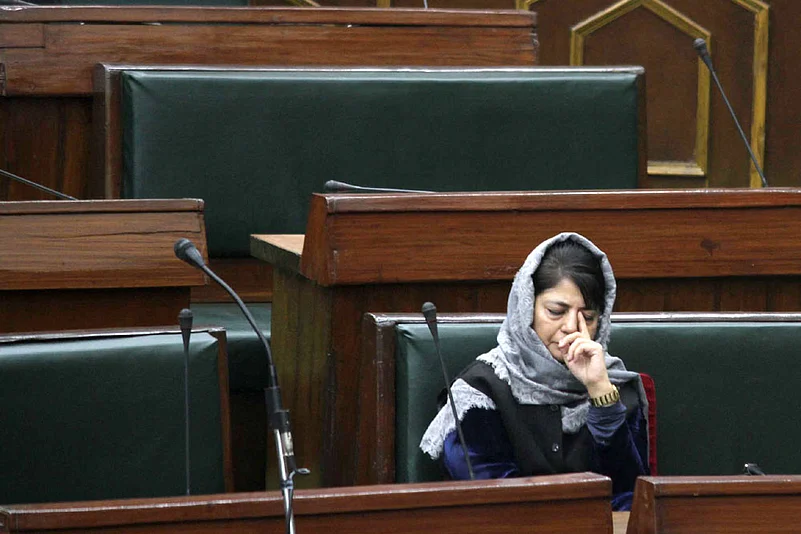The PDP-BJP ruling alliance is about to complete two years. To many observers, that is quite a feat considering the two parties don’t see eye-to-eye ideologically and the alliance’s architect, former chief minister Mufti Mohammad Sayeed, is no more. The latest survival test it scraped through came last month when Chief Minister Mehbooba Mufti, in her speech at the Legislative Assembly, described as “anti-nationals” all those who demand the abrogation of the Article 370 of Indian Constitution, which gives special status to Jammu and Kashmir. Speaker Kavinder Gupta, who calls himself a “proud RSS worker”, saved the coalition by adjourning the assembly the next day. A BJP member had wanted to get the reference to “anti-nationals” expunged from the records, and with Gupta’s permission, it would have amounted to a no-confidence motion against the CM.
However, Mehbooba’s recent cabinet reshuffle proved that all is not well with the PDP either. Two of its ministers resigned soon after. Basharat Bukhari, who was divested of the revenue ministry, had to be persuaded by the CM before he agreed to return as minister for horticulture, while Imran Raza Ansari, who resigned as minister for sports and information technology, technical education and youth services, has not taken his resignation back as we go to press, having left instead for pilgrimage to Iran and Iraq.
“We are concerned about the rise of non-entities like Naeem Akhtar in the party while genuine politicians are pushed to the margins,” says Imran’s uncle Abid Ansari, PDP MLA from Zadibal. Abid has no love lost for Akhtar, the bureaucrat-turned-politician, who was the education minister and has now been allotted the high-profile roads and buildings portfolio. A close aide of Mehbooba, Akhtar is widely seen as an outsider in the party as he has not contested any election.
Several MLAs are miffed at being ignored in PDP’s first cabinet reshuffle and it is telling upon the party’s functioning. “There is no communication between the CM and the ministers, no directions to the MLAs,” says a PDP MLA. “We don’t know what’s going on.” The party’s standing in the Valley has anyway been unenviable since over 80 civilians were killed and more than 15,000 injured in bullet and pellet firing by government forces during the months of protest following the killing of Hizbul Mujahideen commander Burhan Wani on July 8 last year. No wonder party MLAs expect portfolios that enable them to showcase developmental work to regain lost ground in their constituencies.
“We cannot win on the basis of slogans now,” admits a PDP leader. “Only developmental work and progress on the Agenda of Alliance (AoA) can help us retain power when elections are held.”
Many PDP legislators are also baffled by how Mehbooba, unlike her father during his 10 months as CM, has accommodated all the leaders who lost in the 2014 assembly polls. For example, Nizamuddin Bhat, who was defeated by Usman Majid of the Congress in North Kashmir’s Bandipora constituency in 2014, has been made vice-chairperson of the State Horticulture Development Board with MoS status. Peerzada Mansoor Hussain has been given the same post in the Jammu and Kashmir Khadi and Village Industries Board and Peer Mohammad Hussain in the J&K Wakf Board and Rafi Ahmed Mir in the Tourism Development Corporation.
PDP youth leader Waheed-ur-Rehman Parra has been made secretary of the powerful J&K Sports Council. “Imran Ansari and Basharat Bukhari resigned because of Parra being in the sports council and Bhat heading the horticulture board,” a PDP insider tells Outlook. Also, Mehbooba’s maternal uncle Sartaj Madani, who, say insiders, was an outcast during her father’s tenure, is now the PDP’s general secretary.
A large section of the PDP says the BJP was their best option for alliance considering the Congress’ track record in Jammu and Kashmir, but laxity in the implementation of the AoA, coupled with sidelining of the elected MLAs, will affect the government’s functioning. The AoA was the basis of the coalition stitched together by Mehbooba’s father, which led to the formation of the PDP-BJP government in March 2015. According to the AoA, the coalition was supposed to facilitate a sustained and meaningful dialogue with all internal stakeholders, including all political groups, irrespective of their ideologies and predilections. It also promised to maintain status quo on all the constitutional provisions pertaining to Jammu and Kashmir, including its special status enshrined in Article 370. Conceding that both parties have historically differed on the Armed Forces (Special Powers) Act (AFSPA), the AoA states that the coalition government will examine the need to denotify “disturbed areas”.
“Two years have passed, so we want to see progress on the AoA and the dialogue process. Our party will push for the dialogue process in the coming months,” says Mohammad Ashraf Mir, a PDP leader who defeated the then CM Omar Abdullah in the 2014 assembly election but was stripped of his MoS status after Mehbooba took over as CM.
While some PDP leaders are a tad nervous about the outcome of the assembly election in Uttar Pradesh, Valley-based BJP leaders say that by entering into an alliance, the PDP has long passed its worst. “The PDP crossed the political Rubicon the day it allied with the BJP. It was the worst thing that could have happened to the PDP,” Dr Hina Shafi Bhat, a 36-year-old dental surgeon who is the BJP’s face in the Muslim-majority Valley, tells Outlook. “I think the PDP is no longer bothered about anything, not even the Uttar Pradesh election results.”

(left) Imran Raza Ansari; Basharat Bukhari
According to Dr Bhat, politics in Jammu and Kashmir is usually insulated from and immune to what happens outside the state. “On the other hand, the growing unrest in the Valley and the high casualties among the security forces do have an impact on politics outside Jammu and Kashmir,” she says. “This might well play out in open after the assembly polls in Uttar Pradesh.”.
For the BJP, the major concerns are the rise in militant attacks on government forces and the high level of attrition in the Army over past two months. According to Valley-based BJP spokesperson Khalid Jehangir, when politicians such as former CM and veteran National Conference leader Farooq Abdullah take extreme positions and extol the militants and the Hurriyat Conference, it should worry everyone.
On February 24, Farooq had said publicly that the militants are sacrificing their lives for freedom. “If our children are offering sacrifices today, it means they do not want to become MLAs or MPs or ministers,” he said. “They offer sacrifices for their rights. This is our land, we are its owners.” Across the Valley, Farooq’s statement, which he has not retracted so far, is being seen as a reflection of the ground reality and an attempt to tap into the growing anti-PDP sentiment for making electoral gains. Of the three Lok Sabha seats from Kashmir, two have fallen vacant with Mehbooba resigning from her South Kashmir parliamentary constituency in June last year and senior PDP leader Tariq Hamid Karra giving up the Srinagar seat on September 15. Karra, who had trounced Farooq in the 2014 general election with a margin of 42,280 votes, making the former CM taste electoral defeat for the first time in his long political career, resigned in protest against the killing of protesters by government forces.
PDP leaders are keen that the forces shouldn’t do anything that would make governance difficult in the state. “Given the rage among people in the Valley, the groundswell of support for militants and the Indian Army chief’s statement describing stone-pelters as ‘overground workers’, I fear that our agenda of governance will be in tatters should any tragedy take place in South Kashmir,” says a PDP MLA from South Kashmir. By “tragedy”, he meant large-scale killing of stone-pelting protesters during the army’s operations against militants.
Ahead of elections for the two vacant Lok Sabha seats, likely to be held in April, the PDP is keen to see some progress on its political agenda. But as it takes two to tango in a coalition government, there is little hope of the PDP regaining lost ground without the BJP coming forward. As fears of another bloody summer looms in Kashmir, Mehbooba rushed to Delhi last week to meet the prime minister and canvass for “time-bound steps for the effective implementation of the AoA”. However, the BJP has not given any such assurance so far. Mehbooba, meanwhile, embarked on a pilgrimage to Mecca, leaving many of her party leaders weighing their options.
By Naseer Ganai in Srinagar


























